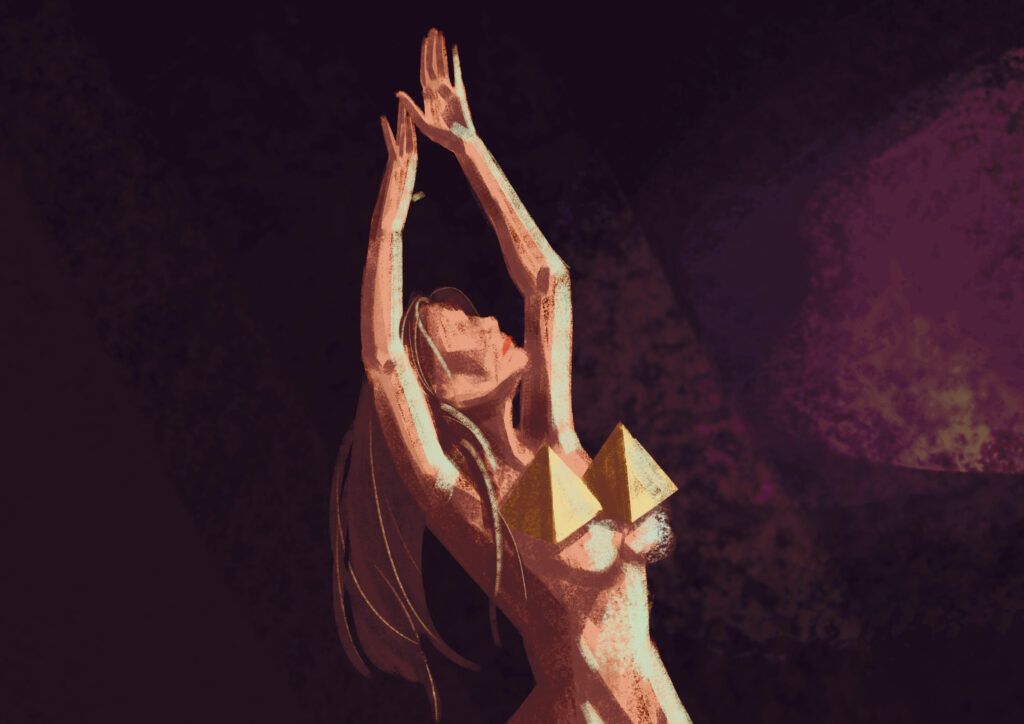There is a woman- naked but for two statues of pyramids over her nipples- undulating in a mahogany, lamplit room while a cabal of men, each crowned with a red fez, sit circled around her, smoking cigars and trying not to make eye contact. I can’t help but think that it’s possible she’s being objectified.
We’re here because my cousin Bino wants to see tits. It’s all he wants to see, ever, his theory on naked women being roughly the same as the orphans in Oliver!’s thoughts on food, glorious food: nothing in life is so common yet so elusive, nothing so delicious yet hard to taste.
I love the boy. I do. Twenty years my junior, he’s a sweet kid who means well but who has dwelled his entire life in the same small central Italian town, and even though he’s long ago put his foot through the door of puberty he is burdened, heavily, living in a place where he has to be simultaneously untouched, ever, and Italian, all the time.
And so, we’re here: the woman dancing, a friend of mine, suggested I take him out to see the show at a private club on the west side of Manhattan, a place where the upholstery belonged to presidents and everybody mostly sits around harumphing and talking about cotton futures or whatever. Bino’s choux pastry heart melts at the idea that of all the people in the room who’d rise to greet me warmly, it’s the woman with no clothes on. He rises to greet her warmly, too, and then stands up to shake her hand.
It’s all charming, in its way; on his trip to America, Bino did not want to see the nation’s purple peaks, but its softer ones. The plains of Oklahoma were not the fertile fields he had in mind.
This is the culmination of a whirlwind tour of New York City that has lasted days, and lord knows I have tried to provide something bigger: Bino (short for Beniamino, though in fairness genetics have assured that everything about him, in fact, short) is an absurdly handsome man- square jaw, black wavy hair, large eyes that see right through you, and a kind, honest, easy smile that portrays the man he’ll one day be. But he is also, for better and for worse, a guy whose margins do not enlarge. He is unburdened, as far as any of us can tell, by any internal monologue; once, back in Rome, my aunt and I took him to a fortune teller to figure out what grand future might be in store for him. The seer, looking inside his mind, expects to find in young men worries of lovers, or their bank accounts, but in him found only the sound of a gentle breeze.
When I take him to the museum, he likes paintings that have dogs.
His favorite fauna in America is the gummy bear.
At a jazz club, the cacophony confuses him, and his head tilts further and further down towards the bar as he stares at the musicians, trying to make sense of it, his face growing more and more taut in wonder until it seemed a little blob of blood might squirt out of his head every time he had a thought.
Still, it’s hard not to like somebody who is so genuine in his worldly desires. His English is impeccable from his work as a chauffeur back in the homeland, so there’s no misunderstanding when I ask him what he’d most like to do in this country, and he immediately says I want to meet a beautiful American woman. An incredible American woman, like in the movies. A perfect woman. And I want to see her naked.
“Men at forty learn to close softly doors they will not be going back into,” wrote the poet Donald Justice, and it turns out they open them pretty gently, too. “So listen,” I ask my friend, “I’ve got a favor. Have any gigs coming up? My cousin is in town. He’s a nice kid, he likes pretty girls. Thought I could take him out, make him feel a little special.” She was thrilled to help, and suggested the venue: a Moroccan-themed party at a private club for millionaire philanthropists. “I’ll be wearing only pyramids,” she says, and I decide not to tell her that Morocco is an entirely different country.
I’ve known her for about ten years; a stunning olive-skinned woman whose hair falls in ringlets and seems, supernaturally, to never change in length, I was originally hired to make photographs for a burlesque review in which she was performing. We struck up an easy friendship, the kind New York is good at: I don’t know the names of her parents, but I know how she takes her coffee. She has no idea where I’m from, but knows that I prefer tea.
She works as a paralegal by day for a European-American law firm, but at night it’s tassels and belly-dancing; it’s an art form, she’ll tell you. She means it, and she’s right. And she’s great at it, practicing daily and performing once or twice a week. This weekend, it’s Morocco, but on Tuesday next, she’ll be in France: stripey shirt, beret, even a little mustache that’ll all come off. It’s a nice show.
“Bino, if you’re gonna fit in,” I tell him, “You’re gonna have to look the part.” I take him to a store where I buy him the cheapest white suit I can find, though he objects strenuously. “I cannot wear white,” he says, “it is February. White is just for summer.” “It is not February of 2020,” I remind him. “It is Morocco of 1919.”
“Yes, but even in Morocco they have winter,” he retorts.
“Not in 1919 they didn’t.”
Then it’s off to a costume shop that sells us a red fez. The only one they’ve got has a little tassel on it that, especially considering his size, makes him look a little bit like the handsomest-case-scenario of Aladdin’s monkey.
When we arrive, I give a password – it’s, uncreatively, “Marrakech”- but inside the club is just what you’d want, the sort of place where murders happen in Humphrey Bogart movies or, at the very least, where Indiana Jones got the clap.
Everybody drinks cocktails that cost no money but are improbably strong; Bino orders an old-fashioned because I order an old-fashioned; I order an old-fashioned because I do not know another drink.
After my friend the dancer sweeps through to kiss my cheek and stun Bino into silence, she slips backstage to make a grander entrance as the man, now two drinks in and remembering they rule the universe, stare at her dancing in much the way that lions, on the serengeti, watch gazelles. Bino sits rapt- not aroused, but stunned, impressed at the artistry of it. He’s never seen the ballet, but I can tell he’s watching one now. All the youth washes off his face; he does not see her as an object, but an artist, pyramids and all. If she has a job, he cannot define it; if she has an art, he cannot name it but he has seen, in a strange little club on a February night in summer in New York City in Morocco, a tiny unexplained sliver of the American dream.
One of the men- the biggest belly, the biggest fez- watches her slide out of a fast turn across the floor on her shins wearing almost nothing. He grabs her thigh and pulls her towards him, and I look up to see that Bino has disappeared: a flash, a fervor, as he’s run over to the scene of the crime. Bino runs over to the man- who’s halfway into standing to greet him- and punches him with a hard uppercut, sending the clumsy groper into the air, flying cartoonishly, looking like somebody had just sockwalloped a 19th century steel tycoon.
Reader, we were ejected.
We waited outside- I, stunned, but Bino because… I don’t know. Maybe for the first time in his life he’d seen a mermaid. Maybe for the first time in his life he’d seen a woman. A beautiful woman ends in a fish’s tail, says an old Italian proverb. It connotes disappointment.
We sat outside on a stoop on a February night- Morocco gone, only Manhattan- for twenty minutes until she finally came out, smiling to see Bino and, perhaps, me too.
She walks over to us, and Bino kisses her hand. “Thank you so much,” Bino says. “I asked my cousin to introduce to me the most beautiful American woman, and tonight he has. Thank you.”
“Where are you from?” she asked.
“I am from Rome.”
She looked at me with shock, and back at him, and then smiled.
“Anch’io,” she answered, in Italian. “Me too.”


